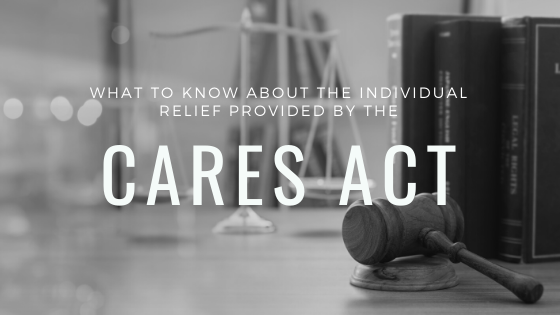
As the coronavirus crisis hit a fever pitch in late March 2020, Congress passed an unprecedented $2.2 trillion relief package known as the Coronavirus Aid, Relief, and Economic Security (CARES) Act. While much of the CARES Act focuses on keeping businesses afloat in these troubled times, certain provisions are intended to provide direct aid to individuals and families. Learn more about the relief individuals can receive under the CARES Act.
2020 Recovery Rebates
This relief, sometimes known as the “CARES Act tax credit,” provides qualifying individuals with a check for up to $1,200 (or $2,400 for a married couple) plus an additional $500 per child. This means that a married couple with two children can be eligible for up to $3,400 from the federal government.
Recipients who can qualify for the full amount available under the 2020 Recovery Rebate include:
- U.S. residents with a work-eligible Social Security number;
- who have an adjusted gross income (AGI) of less than $75,000 per year (or $150,000 for a married couple), and
- are not a dependent of another taxpayer.
The $1,200 available per individual will be reduced by $5 for every $100 the taxpayer’s income exceeds the phase-out threshold, and single filers earning more than $99,000 (and joint filers earning more than $198,000) will be ineligible for the Recovery Rebate.1
Most Americans won’t need to take any action to receive this tax credit; for those who paid their taxes (or received a refund) via direct deposit, the Recovery Rebate will be direct-deposited sometime in April. For those who have already filed, the IRS will use 2019 tax information to determine eligibility, while those who are taking advantage of the tax-filing extension will be evaluated on their 2018 tax information.
Retirement Assistance Plan Withdrawals
Normally, withdrawing funds from your 401(k) or IRA early (that is, before age 59.5) can wallop you with income taxes and a hefty penalty. But under the CARES Act, any “coronavirus-related distributions” of up to $100,000 can be exempted from the 10 percent penalty and the mandatory 20 percent tax withholding, putting more money into recipients’ pockets.
Also, those who “re-contribute” the withdrawn funds to the plan within three years can avoid ever paying any income tax on this transaction; instead, the withdrawal and re-contribution will be treated as a trustee-to-trustee transfer.
Important Disclosures:
The opinions voiced in this material are for general information only and are not intended to provide specific advice or recommendations for any individual. To determine which investment(s) may be appropriate for you, consult your financial professional prior to investing. All performance referenced is historical and is no guarantee of future results. All indices are unmanaged and cannot be invested into directly.
The information provided is not intended to be a substitute for specific individualized tax planning or legal advice. We suggest that you consult with a qualified tax or legal advisor.
LPL Financial Representatives offer access to Trust Services through The Private Trust Company N.A., an affiliate of LPL Financial.
LPL Tracking # 1-978175 (exp. 4/21)

